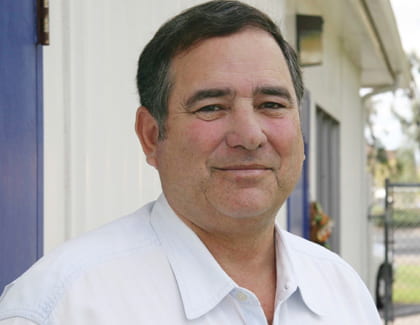Treating kids right
Dr. Ronald Kotkin helps make a difference in the lives of children with ADHD and their families

With their walls festooned with alphabets and art projects, the classrooms at UCI’s Child Development Center School look much like those in regular elementary schools. Students pore over books, huddle with teachers at pint-sized tables and track completed tasks on a chalkboard. Yet something different – even radical – is going on in these otherwise ordinary classrooms.
Since 1982, the CDC school has been at the forefront of educating and treating children with Attention Deficit Hyperactivity Disorder and related behavioral and learning problems. Often, youngsters who come here have run into trouble in general education classrooms, and the one-year program helps them get back on track.
“We’re one of the best-kept secrets in Orange County,” says Dr. Ronald Kotkin, CDC school director and clinical professor of pediatrics, who developed the program with James Swanson, UCI pediatrics professor, and Steve Simpson, formerly a school psychologist with the Orange County Department of Education. The program currently serves 45 students in grades 1-6; most come from Orange County, although families have moved from other countries just to enroll their child.
“We’ve taken kids who have fallen through the cracks and developed a state-of-the-art, research-to-practice program that helps them be successful,” Kotkin says. “I’ve had parents call me over the years and say this program saved their life. Former students have come back as adults and told us, ‘Had it not been for this center, I’d have been in serious trouble.’ It’s a place where someone cared about them.”
Often, the gravity of students’ problems go unnoticed until they enter school and begin acting out in class, not paying attention or having difficulties with their peers. ADHD is characterized in part by poor social skills, inattentiveness and/or hyperactivity and impulsivity. Diagnosing ADHD can be difficult because many of its symptoms mirror or overlap with those of other disorders.
“Their teachers can get the impression these are just lazy kids because they might be captivated by a topic one minute, and looking around the classroom the next,” Kotkin says. “But it’s their symptoms that cause them to lose focus.”
Diagnosing and treating ADHD, autism and bi-polar disorder is the focus of the second annual joint conference by the CDC and Orange County Department of Education at the department’s Costa Mesa headquarters 7:30 a.m.-3 p.m Friday, April 11. Intended for parents, psychologists, nurses, school psychologists, teachers and others who serve the population, it will include a talk by Kotkin on behavioral strategies that have worked at the center and features renowned speakers from the UCI Department of Pediatrics.
To keep their students focused, CDC teachers from the Orange County Department of Education give frequent positive reinforcement. UCI social science students also work as trained behavior specialists with the youngsters.
“Our kids get feedback every half-hour about what they do well,” Kotkin says. For many, it’s a big change from the past, when they attracted attention mainly when they misbehaved.
“We tell them everything they do right. And we never call the parents to say ‘Your kid was a problem today.’ We make things fun and motivating so kids feel really good about themselves. We accept them for who they are.”
Parents get involved, too. They’re also trained in behavior modification, so strategies that work at the center can be used at home and in the child’s next public or private school.
“Dropping the kids off and hoping we’ll ‘fix’ them is not an option. We’re trying to empower the family,” Kotkin says. “We’ve developed a program that helps kids make gains beyond our setting.”
